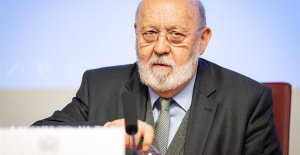The PP seeks to arm itself with arguments for its offensive while waiting to see how the Government justifies the amnesty in the preliminary title
MADRID, 7 Oct. (EUROPA PRESS) -
The PP is preparing for the political and legal combat against the amnesty by gathering the opinion of experts in the world of Law outside the party with the aim of arming itself with arguments on which its actions against the foreseeable Amnesty Law will be based, as a possible appeal to the Constitutional Court.
In these weeks the PP has contacted former presidents of the Constitutional Court (TC) and the General Council of the Judiciary (CGPJ), professors of Constitutional Law and other specialists in the world of Law. What's more, he has consulted the jurisprudence of the European Court, according to what party sources have told Europa Press.
Those legal experts who are advising the PP consider that an Amnesty Law for those accused in the 'procés' does not fit into the Spanish legal system and is illegal. "They cannot find how what is illegal can be made legal," added the sources consulted.
The 'popular' consider that the amnesty is an "asymmetric treatment at a legal level" and criticize that the left is willing to put aside "the equality of all Spaniards" to give "privileges to the Catalan political class." Furthermore, they remember that in the past the amnesty has been used for the transition between two different political regimes.
"What the PP is doing is putting together the scaffolding from the point of view of the concept of the amnesty, compiling when it has been given and under what circumstances it has been allowed," said PP sources, who are also studying the parliamentary precedents.
Thus, the PP sees what happened in the last legislature as key, when ERC and Junts registered a proposed amnesty law in March 2021 - it was not admitted for processing due to the lawyers' report, which rejected it as unconstitutional - -, as well as the motion resulting from interpellation that the CUP promoted in May of that same year and that was rejected in the Plenary Session of Congress.
In this last case, the pro-independence party tried to use its motion for the Plenary to rule in favor of admitting the Amnesty Law to processing, but in the end that part of the text was eliminated by the majority of the Board following the criteria of the Congressional lawyers.
From 'Génova' they have criticized that the Government hides behind "coexistence" to justify the Amnesty Law. "Three or four months ago the Government itself said that it did not fit into the Constitution. Sánchez is talking about coexistence when the exact word is convenience. And that is not a legal concept," sources from the formation told Europa Press.
According to the PP, in this possible Amnesty Law the preliminary title is fundamental, more than the article, because it is where the justification of the norm lies and that is where, in its opinion, the Government will seek to overcome obstacles to "silence possible resources." before the TC or the European Court.
Thus, according to the sources consulted, the preliminary title has to explain the political reason why this amnesty is applied, which will lead to a restriction of article 24 of the Constitution, which states that "all people have the right to obtain effective protection of judges and courts in the exercise of their rights and legitimate interests, without, in any case, being defenseless."
"The Government's text must explain why an amnesty is necessary, which represents an invasion of the Executive Branch in the Judicial Branch," said PP sources, who have stressed that the Constitution does not allow an amnesty and Spain is not in "a moment of extraordinary gravity to reinterpret the Constitution" with a measure of this magnitude, as happened in the dictatorship.
Thus, PP sources have stressed that the pardon is a measure of grace from the Government but have added that the amnesty will "prohibit" judges and prosecutors from acting against the prosecution of crime. "In Spain we have a Judicial Power that is democratic and solid and the amnesty would be to recognize that it acted inappropriately," they added.
PP sources consider that the Government has focused on Conde-Pumpido, so that "the responsibility of legalizing the amnesty for the 'procés' which is clearly illegal is transferred to the Constitutional Court."
Regarding the deadlines in which the court of guarantees can rule, in the PP they remember that with the arrival of Conde-Pumpido to the TC the appeal against the Abortion Law was resolved in 11 months, when it had been in the drawer for a decade.

 Exploring Cardano: Inner Workings and Advantages of this Cryptocurrency
Exploring Cardano: Inner Workings and Advantages of this Cryptocurrency Seville.- Economy.- Innova.- STSA inaugurates its new painting and sealing hangar in San Pablo, for 18 million
Seville.- Economy.- Innova.- STSA inaugurates its new painting and sealing hangar in San Pablo, for 18 million Innova.- More than 300 volunteers join the Andalucía Compromiso Digital network in one month to facilitate access to ICT
Innova.- More than 300 volunteers join the Andalucía Compromiso Digital network in one month to facilitate access to ICT Innova.-AMP.- Ayesa acquires 51% of Sadiel, which will create new technological engineering products and expand markets
Innova.-AMP.- Ayesa acquires 51% of Sadiel, which will create new technological engineering products and expand markets The PP sees the concentration of support for Sánchez in Ferraz as a "failure" and believes that it "complicates" the story of its continuity
The PP sees the concentration of support for Sánchez in Ferraz as a "failure" and believes that it "complicates" the story of its continuity Marc Márquez returns to pole in Jerez
Marc Márquez returns to pole in Jerez The CIS carries out a quick survey on Sánchez's letter to measure the reaction of citizens
The CIS carries out a quick survey on Sánchez's letter to measure the reaction of citizens 12M.- Puigdemont to Sánchez and Illa: "This is not about the future of the PSOE! What have you believed?"
12M.- Puigdemont to Sánchez and Illa: "This is not about the future of the PSOE! What have you believed?" How Blockchain in being used to shape the future
How Blockchain in being used to shape the future Not just BTC and ETH: Here Are Some More Interesting Coins Worth Focusing on
Not just BTC and ETH: Here Are Some More Interesting Coins Worth Focusing on UPV students build a prototype of a wooden house to move to Equatorial Guinea
UPV students build a prototype of a wooden house to move to Equatorial Guinea The UA opens the call for the Impulso 2024 Awards for the best innovative business initiatives
The UA opens the call for the Impulso 2024 Awards for the best innovative business initiatives ALI, virtual assistant from Alicante, internationally recognized by the OECD
ALI, virtual assistant from Alicante, internationally recognized by the OECD Retrópolis brings the golden age of video games and computing to the UPV
Retrópolis brings the golden age of video games and computing to the UPV A million people demonstrate in France against Macron's pension reform
A million people demonstrate in France against Macron's pension reform Russia launches several missiles against "critical infrastructure" in the city of Zaporizhia
Russia launches several missiles against "critical infrastructure" in the city of Zaporizhia A "procession" remembers the dead of the Calabria shipwreck as bodies continue to wash up on the shore
A "procession" remembers the dead of the Calabria shipwreck as bodies continue to wash up on the shore Prison sentences handed down for three prominent Hong Kong pro-democracy activists
Prison sentences handed down for three prominent Hong Kong pro-democracy activists ETH continues to leave trading platforms, Ethereum balance on exchanges lowest in 3 years
ETH continues to leave trading platforms, Ethereum balance on exchanges lowest in 3 years Investors invest $450 million in Consensys, Ethereum incubator now valued at $7 billion
Investors invest $450 million in Consensys, Ethereum incubator now valued at $7 billion Alchemy Integrates Ethereum L2 Product Starknet to Enhance Web3 Scalability at a Price 100x Lower Than L1 Fees
Alchemy Integrates Ethereum L2 Product Starknet to Enhance Web3 Scalability at a Price 100x Lower Than L1 Fees Mining Report: Bitcoin's Electricity Consumption Declines by 25% in Q1 2022
Mining Report: Bitcoin's Electricity Consumption Declines by 25% in Q1 2022 Oil-to-Bitcoin Mining Firm Crusoe Energy Systems Raised $505 Million
Oil-to-Bitcoin Mining Firm Crusoe Energy Systems Raised $505 Million Microbt reveals the latest Bitcoin mining rigs -- Machines produce up to 126 TH/s with custom 5nm chip design
Microbt reveals the latest Bitcoin mining rigs -- Machines produce up to 126 TH/s with custom 5nm chip design Bitcoin's Mining Difficulty Hits a Lifetime High, With More Than 90% of BTC Supply Issued
Bitcoin's Mining Difficulty Hits a Lifetime High, With More Than 90% of BTC Supply Issued The Biggest Movers are Near, EOS, and RUNE during Friday's Selloff
The Biggest Movers are Near, EOS, and RUNE during Friday's Selloff Global Markets Spooked by a Hawkish Fed and Covid, Stocks and Crypto Gain After Musk Buys Twitter
Global Markets Spooked by a Hawkish Fed and Covid, Stocks and Crypto Gain After Musk Buys Twitter Bitso to offset carbon emissions from the Trading Platform's ERC20, ETH, and BTC Transactions
Bitso to offset carbon emissions from the Trading Platform's ERC20, ETH, and BTC Transactions Draftkings Announces 2022 College Hoops NFT Selection for March Madness
Draftkings Announces 2022 College Hoops NFT Selection for March Madness























